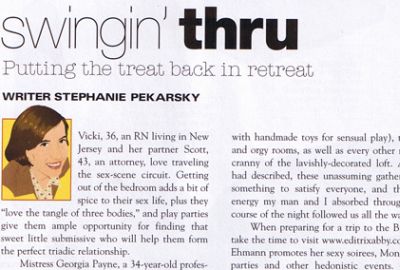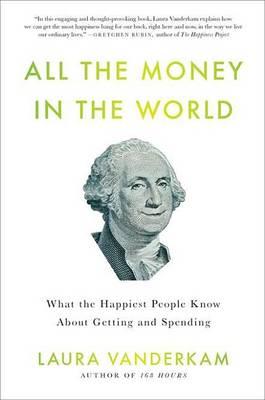 This past weekend, I attended the ASJA 2012 Writers Conference, which I had been freaking out about for months. I was invited to speak on a panel about sex writing and, not only did the prospect of speaking to a crowd of professional journalists and authors intimidate me, but I felt self-conscious about the fact that I was the only panelist without a book. (It didn’t feel right to count the ebook I’d co-authored the other year.)
This past weekend, I attended the ASJA 2012 Writers Conference, which I had been freaking out about for months. I was invited to speak on a panel about sex writing and, not only did the prospect of speaking to a crowd of professional journalists and authors intimidate me, but I felt self-conscious about the fact that I was the only panelist without a book. (It didn’t feel right to count the ebook I’d co-authored the other year.)
I worried: Would attendees think I wasn’t accomplished enough to give them advice? Would they roll their eyes as I hid behind my notes and stuttered over my words? Would they riot over the fact that the organization had allowed such a poor public speaker to have access to the mic? (I have an over-active imagination… )
As per usual, I was overreacting, and I made it through the panel alive. And after that, I was able to enjoy the other panels and presentations throughout the day. I found it to be a great opportunity to see how others structured their panels. I was able to see what worked, and what didn’t. And at the end of the day, I was convinced: I should do this again.
Putting together a panel — whether at a major conference or as a smaller, standalone event — can be a great marketing tool. It can help you establish yourself as an expert. It can bring you into contact with other luminaries in your field. It can raise your visibility. It can strengthen your writing resume. It can even act as a source of income!
But putting together a successful panel? That’s something else.
Here’s what I learned from just one day at the ASJA conference:
Make It a Conversation. For our Writing About Sex panel, we each gave a 10-minute presentation, and then segued into the Q+A. Which was fine, because we each had something slightly different to share (I spoke about the variety of sex writing markets out there; Rachel Kramer Bussel spoke about submitting to erotica markets; Rae Francoeur spoke about writing literary erotica; and Joan Price spoke about promoting your sex writing). But sometimes lectures (even mini-lectures) are not as engaging as conversations.
In contrast, when I later attended Breaking Through to Online Business Markets and, later still, What’s Next Once Your Book Comes Out, the moderator asked the other panelists questions, which they each answered in turn. It allowed each panelist to share their slightly-different perspective on the topic at hand, and also broke things up in such a way that the audience remained engaged.
Noted.
Make It Focused. Another thing my panel — and others throughout the day — had in common is that they were aimed at two different audiences. For example, our sex writing panel was aimed at both nonfiction sex writers and erotica writers. Other panels were aimed at both freelance article writers and book authors. In some cases, attendees may be interested in both areas. But oftentimes, a writer who is in the mag-querying mindset is not in the book-writing mindset, and vice versa.
Which means that half your audience may find their eyes glazing over for half your presentation.
And there’s nothing scarier than staring out into a sea of writers and seeing bored faces.
Think carefully about the audience you want to reach, and what you want their takeaway to be.
But Not Too Focused. I attended Breaking Through to Online Business Markets because — I don’t know — sometimes it’s nice to write about something other than sex. The three panelists there were editors for three different business/financial publications and, as such, they shared a lot of super-fantastic advice on what their publications were looking for, and how best to pitch them.
I loved getting that insider perspective but, in some ways, it was too specific. What about the other business/financial publications out there? As a beginning business writer, how could I break into that niche in general?
I left the panel feeling that maybe I wasn’t ready to break into that market, though I certainly had the lowdown on how best to pitch those particular publications once I’d become a more seasoned business writer.
Provide Value. Of all the service content I read online, my favorite posts are always the ones that provide clear, step-by-step instructions for getting things done, concrete ideas, and valuable resources. Unfortunately, most of the posts I come across are a lot more general than that, providing inspiration and empowerment, but no clear tips for reaching my goals. These posts provide me with a boost of excited optimism… but then leave me hanging, asking myself: What’s next?
How can you provide value? It’s an important question to ask yourself when drawing up blog posts and newsletters and, in the same way, it’s an important question to ask yourself when putting together a panel.
My fellow panelists and I focused on specifics when giving our presentations. I, for example, mentioned specific publications, the columns they were looking to fill, and their pay rates. I even included editor contact info in our online handout. Similarly, at the What’s Next Once Your Book Comes Out panel, the panelists shared creative ideas for book promotion and, in their online handout, included a slew of resources, including Jenny Blake’s uber-comprehensive, 15-tab, book marketing spreadsheet. Now that’s what I call value!
Brainstorm how you can help your audience take action now.
For the love of god, go off-book. When I first started talking during our panel, I made eye contact with the audience, filling them in on my background as if we were having a casual, one-on-one chat. But as I went on, diving into the nitty-gritty of publications and pay rates, I found myself relying more and more on my notes. I was making less eye contact with the audience, and I could even hear my voice transitioning into Boring Lecture Mode.
If you’d gotten the chance to take a peek at my notes, you would’ve seen that I’d typed out every goddamn word I wanted to say. I was so afraid my mind would go blank, or that I’d start having a panic attack, that I didn’t want to leave anything to chance.
In contrast, when I looked over at Rachel’s notes, I saw a single, scribbled-on piece of paper containing headings and bullet points. And that’s about it.
As a result, she was able to maintain that casual air, and keep her audience engaged.
Color me jealous.
Speak Loud, Clear, and Slow. My middle school history teacher always used to tell us this. It’s a good mantra to remember. Yet I always seem to devolve into full-blown panic, mouth drying up, sentences coming faster and faster so that I inevitably stumble over my words. Consider me your cautionary tale. Use me as an example of what not to do.
(I’m actually considering joining the Toastmasters Club as a way to get more confident with public speaking, and receive feedback on my presentations. I went to a meeting the week before the conference, and it actually eased some of my fears.)
Get the Audience Involved. Q+As are obviously a great way to do this, and are standard at many public presentations. But I thought it was an especially inspired move on Rachel’s part when she asked our audience members to share the negative repercussions they’d experienced as a result of their sex writing. (Kayt Sukel’s description of the creepy emails she receives from creepy dudes? Priceless.)
How else can you get them involved? Worksheets? Pitch session? Ice breaker? Get creative!
Anyone else out there been to an especially good panel? What stood out for you? What worked and what didn’t?
Related: How to Throw an Event That Rocks the House, Are Professional Organizations Worth the Cost?, How to Market Yourself: Getting Out More







 When my literary agent first offered me representation the other week, I tried to play it cool. I told her I was thrilled she was so into my book idea. I told her I’d have to touch base with another agent who also had my full proposal. Then I hung up the phone, my hands shaking, and started to cry.
When my literary agent first offered me representation the other week, I tried to play it cool. I told her I was thrilled she was so into my book idea. I told her I’d have to touch base with another agent who also had my full proposal. Then I hung up the phone, my hands shaking, and started to cry.
